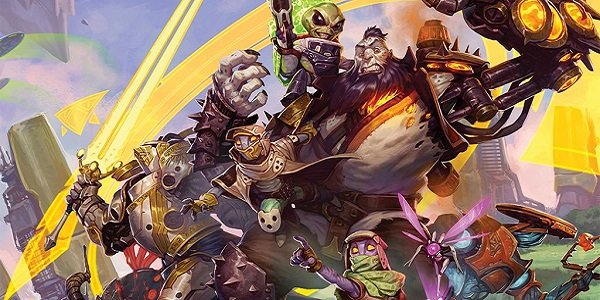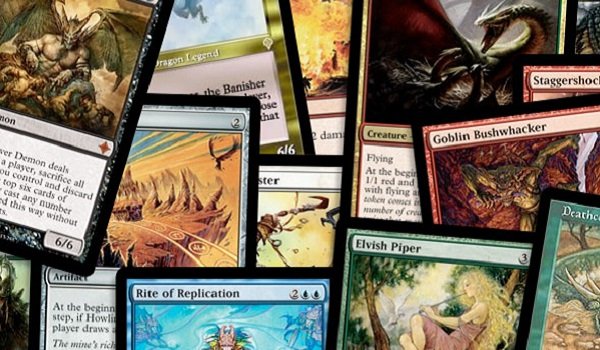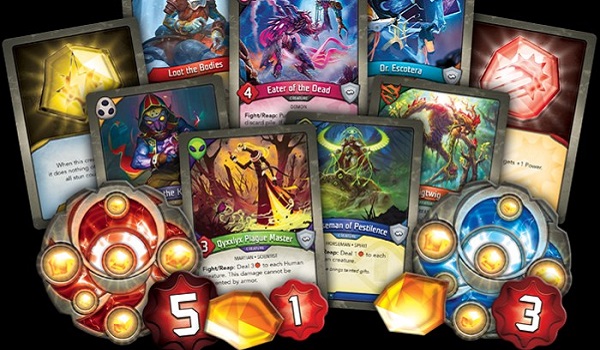Keyforge Fixes The Biggest Problem With Magic: The Gathering

Keyforge is all the rage in tabletop gaming these days due in no small part to the fact that it completely eliminates some of the most intimidating factors seen in almost every other card game. If the idea of buying tons of cards and constructing a deck in games like Magic: The Gathering has you breaking into stress sweats, then you might want to give Keyforge a gander.
It's worth pointing out right off the bat that both Keyforge and Magic were created by the same guy, Richard Garfield. In fact, Keyforge spawned out of Garfield's fond memories of playing Magic with friends back in the day, only in a much more limited format.
What sets Keyforge apart from the pack is that it is a "unique deck game." In short, that means no two decks in the game will ever be the same and, on top of that, the cards in a given deck are set in stone. That means that there is no deckbuilding in Keyforge, so you won't be buying booster packs of cards in the hopes of pulling something useful or, more likely, spending more money online to get the specific cards you want. Instead, you spend 10 bucks on a deck and you're ready to play; your deck can't be altered in any way.

The Problem With Deckbuilding
I fully appreciate the draw of deckbuilding in other card games. I've had several multi-year stints in my life where I've been pretty dedicated to collectable card games like Magic or living card games like Netrunner (also, oddly enough, designed by Richard Garfield).
In case that terminology is a bit confusing, a trading card game is what most people think of when they envision a couple of players sitting on opposite sides of a table, dueling with decks of cards. These games include Yu-Gi-Oh, Magic, Pokemon and more recent popular titles based on Transformers and Dragon Ball. Expansions for those games come out every few months with constructed decks available, as well as lots and lots of booster packs. A living card game has expansions come out at about the same pace but, instead of your traditional booster packs, those games are augmented with single large packs of cards that have everything you need to keep the action going.
But whether you're talking about a trading card game or a living card game, the one thing those types of games typically have in common is deckbuilding. The model relies on players experimenting with the cards, buying more cards, experimenting further and constructing a deck of their own. It can be a heck of a lot of fun, but it's also why I eventually bounce off of more traditional card games.
Using Magic as an example, I would frequently buy a starter deck for a new expansion and start playing games with it. After a while, I'd learn the deck's weaknesses and start paying more attention to the other cards available in the expansion to see which ones might make my own deck better. If I couldn't find the cards I wanted available for purchase on their own, my only option was to turn to booster packs and hope that I got the cards that I wanted. Then I'd typically buy more booster packs. Then more. Then more.
Your Daily Blend of Entertainment News
After a while, I'd be sitting on a mountain of cards I never even use, all in order to have a decent enough deck to compete at local tournaments. In the end, though, I'd almost always lose to the guy who looked up the most successful deck from recent major tournaments and then went out and spent hundreds of dollars to build that optimized deck. I'm totally comfortable with taking a loss, but it always leaves a sour taste in my mouth when I lose to a deck that someone found online and then spent an insane amount of money to "build" themselves.
But, again, I get the draw of that type of card game. Tinkering with a deck is a lot of fun and can be very rewarding, but it frequently comes with a high cost and an insane stack of extra cards I have no intention of ever using.
And those are frequently the factors that keep people from even giving traditional card games a shot. The cost is high, building a deck can be intimidating and there's nothing fun about losing to one of those alpha decks that your opponent didn't even build themselves.

A Totally Unique Experience
And that is precisely why I, and many others, have fallen head-over-heels in love with Keyforge. When you buy a deck of cards, you're literally ready to roll and will never need to, or be able to, alter that deck. Every single deck in Keyforge is created by an algorithm to be unique and feature plenty of synergy between the cards. What's really cool is that, in order to guarantee this uniqueness, all of the decks are given a distinct name and every single card in that deck has the name printed on it. Again, that means there is no deckbuilding in the game.
Sure, you can go out and drop another $10 on another deck if you like, but there's no reason to assume that new deck is going to be "better" than the one you already have. When you sit down across the table from another player, you know for a fact that their deck was created the same way that yours was and that they didn't go out and spend a bunch of extra money on cards or simply look up the "best deck" online. Keyforge is a game that pits skill against skill alone, and it's a breath of fresh air for the genre.
Since I primarily write about video games, this model is especially disorienting to me because it seems to put an emphasis on the game itself rather than "making all of the money in the world." Deckbuilding games like Magic could probably be considered the first loot boxes, as players spend a few bucks on small packs of cards and never know what they're actually buying until they open the pack. That sort of gachapon model has been huge in video games in recent years because it has proven to be a massively successful way for developers to keep getting more money out of the same customer for the same game.
By comparison, Keyforge feels like it was designed to be a fun game that cannot keep milking players through a constant stream of booster packs. Sure, some players will go out there and buy a whole bunch of decks, but the average player can simply buy a couple of decks and call it a day. More importantly, those one or two decks they buy are just as viable as any of the decks Gary Moneybags spent hundreds of dollars to pick up.
Richard Garfield himself summed up these differences perfectly. Garfield used to play Magic with his friends in leagues that saw them pulling cards from a limited supply. As Magic moved away from that style of play, he started to miss the days when players had to rely on a more limited set of resources. In Magic, if a card does not help a deck run like a well-oiled machine, it's quickly tossed into the reject pile.
Garfield compared traditional card games to an amusement park, where players are being told by professionals how to play the game, what the best strategies are and what decks they should be using. Keyforge, by comparison, is the jungle. In Keyforge, you are handed a bag of tools that's completely unlike any bag of tools being handed to the other players. Your job is to learn how to best use those tools, including the ones that might initially seem less beneficial. Whoever learns to use their tools the best is likely to be the winner.
Keyforge is probably the most consumer friendly card game I've ever come across. The game itself is a hell of a lot of fun to play, and I'm seeing more and more people who would not traditionally play these types of card games pick up a deck and give it a try. All of the intimidation factors tied to games like Magic have been thrown out the window, and I'm looking forward to seeing how that resonates with players over time.
Staff Writer for CinemaBlend.

